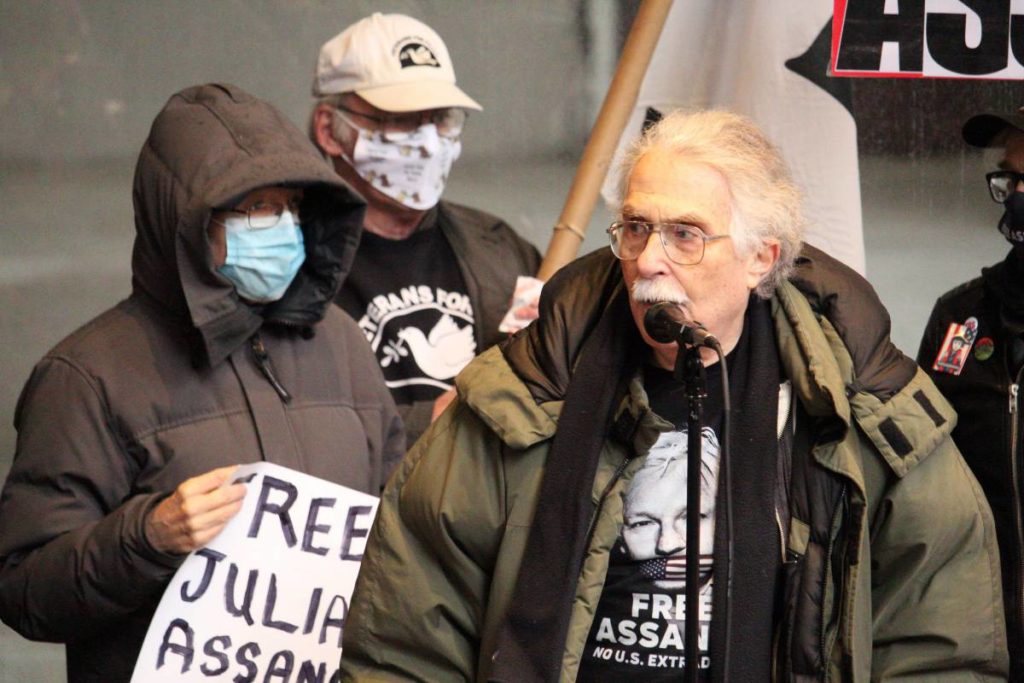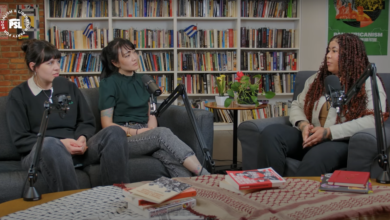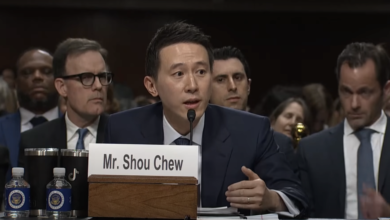Julian Assange, Wikileaks founder and whistleblower of U.S. war crimes, won a major court victory today in London. District Judge Vanessa Baraitser ruled against his extradition to the United States, where the U.S. government wants to try him on 17 espionage charges totaling a possible 175 years in prison.
His supporters cheered outside the courthouse amidst dozens of journalists covering the case. The day before, a New York City rally organized by NYC Free Assange drew dozens of activists.
Beginning as early as 2012, the U.S. government has pursued Assange for his work exposing hundreds of thousands of U.S. military and intelligence documents and videos that show outright war crimes, included targeted murders of civilians in Iraq and Afghanistan.
The judge’s ruling dealt only with the danger to his life if he were extradited. Still, it is an enormous relief for Assange and his supporters. Experts testified as to his serious mental fragility and great danger of committing suicide —given the prospects of imprisonment in U.S. ultra-maximum security — if extradited.
The ADX Super Max prison in Florence, Colo., where he would be imprisoned has the harshest conditions in the U.S. and constitutes outright psychological torture and harsh physical limitations. All prisoners are in isolation cells, never able to touch another human being except for minimal contact with guards.
While elated over his victory, progressive activists in the Assange defense movement are wary of the broader implications of the judge’s overall ruling. NYC Free Assange’s press announcement noted, “It is a great personal victory for Julian, but unfortunately, not a victory for free speech and a free press.”
Baraitser sided with the U.S. Department of Justice prosecutors on the technical and legal issues they argued. She denied every defense argument except for the risk to Assange’s life. The U.S. claimed that Assange is not a journalist and that he neither wrote nor edited the material that Wikileaks published.
Nathan Fuller, Director of Courage Foundation and AssangeDefense.org told Liberation News: “Today’s ruling is a major victory in the fight for Julian Assange’s long-overdue freedom, but it also made clear that the fight to protect press freedom is far from over.
“By agreeing with the prosecution’s claims that Julian is not a journalist and that publishing could be criminalized, she left the door open for the next Assange to be put on trial. Still, we are thrilled at the prospect of Julian walking free — now he must be granted bail while the U.S. appeals today’s decision,” said Fuller.

Chuck Zlatkin, a founding member of NYC Free Assange, expressed elation at the ruling today. “It was such a surprise when we heard. Ninety-nine percent of his supporters felt that the judge would find for his extradition, so it is a huge victory. A tremendous amount of people have been involved in this for a long time. You don’t get that many victories like this.
“This has been a political persecution from the start. Four countries conspired with the U.S. government: Great Britain, Australia, Sweden and Ecuador. Australia didn’t even step up for his rights as an Australian citizen. So it seemed the magistrate was looking for a way to find for Assange, but not antagonize the United States.
“Julian Assange is a hero for not only exposing evidence of war crimes but also the hidden horrors of war,” said Zlatkin, also legislative and political director of NY Metro Area American Postal Workers Union.
In San Francisco a celebration rally was held in front of the British consulate. One speaker, Richard Becker, West Coast director of the ANSWER Coalition said, “The lesson of the Vietnam War for the Pentagon was ‘Don’t show the war, don’t show what is happening to the people there, don’t show what is happening to the soldiers.’ That has been the policy since then. It is only because of people like Julian Assange and Chelsea Manning that the people have learned of the war crimes committed by U.S. imperialism.”
U.S. prosecutors said immediately that they plan to appeal and final resolution on the extradition matter could take months. Thousands of people on social media, including prominent people, are calling on Trump to pardon Assange.
Jan. 6 is the bail hearing in which it is hoped that Assange can be released from Belmarsh prison. His fiancée and former attorney in his case, Stella Moris and his sons, 2 and 4-years old, await him. “We will celebrate the day he comes home,” she said.
Mexico’s President Andrés Manuel López Obrador today offered political aslyum to Assange, saying, “I celebrate that the United Kingdom has acted in this manner, because Assange is a journalist and deserves a chance. I am in favor of his being pardoned.”
Another victim of the U.S. persecution in the Wikileaks revelation was Chelsea Manning, a U.S. soldier in Iraq who provided Wikileaks with the Iraq and Afghanistan documentation. For her role in 2010, she was herself psychologically and physically tortured in U.S. prison after receiving a 35-year sentence under the Espionage Act. The extremely harsh prison conditions drove her to the point of attempting suicide more than once. President Obama commuted her sentence in 2016, but she was persecuted again and imprisoned for refusing to testify before a federal grand jury. Public protests forced her release.
For an in-depth analysis of Assange’s case and the dangerous implications if he were extradited to the United States, watch the PSL livestream with Assange defense activists.
Feature image: NYC Free Assange organized the Jan. 3 rally to call for no extradition of Assange, the day before his court victory. Photo: Pamela Drew





